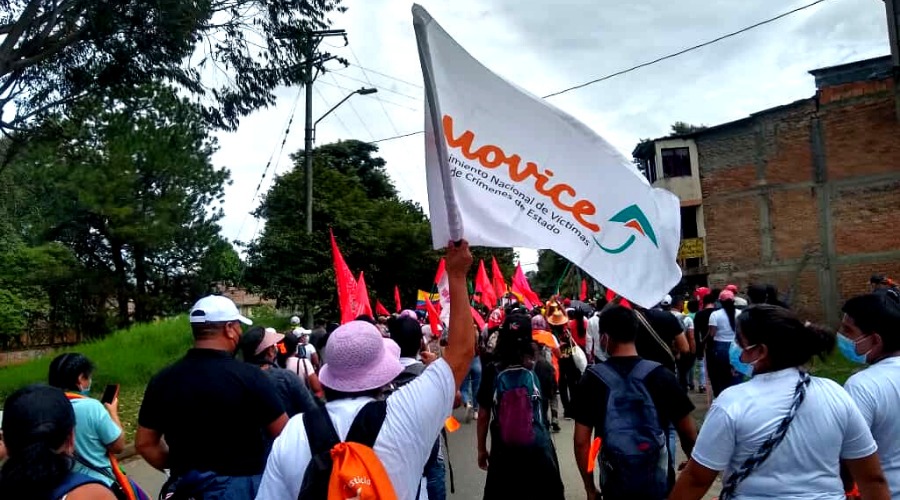Five years and four months after the signing of the Final Peace Agreement, we continue to verify the unwillingness of the Colombian State to recognize its responsibility in the installation of the continued genocide that has sought the annihilation of anyone who has dared to think and act differently. State and paramilitary violence, as recognized by the Permanent Peoples’ Tribunal in its Judgment on political genocide, impunity and crimes against peace in Colombia (2020-2021), has pursued the destruction of collective identities, through strategies of terror and intimidation that, to this day, continue to be the response to the security and public order situations that arise in the national territory.
The recent report published by the United Nations High Commissioner for Human Rights ratified what Movice has been insistently denouncing: the increase of violence in rural areas and some urban centers; the continuity of obstacles to access to justice; the limited comprehensive presence of the State; the scarce guarantees that human rights defenders have for the exercise of their work because they face serious situations of stigmatization and imminent risk; the precarious guarantee of rights and the exacerbated inequality. All of the above is the result of a State that has maximized efforts to hinder the implementation of the Final Peace Accord, has considered the militarization of territories for the resolution of social conflicts, has deepened exclusion, racism and discrimination, has ignored international recommendations for the improvement of the human rights situation in the country and has promoted the privatization of the use of force, promoting paramilitarism.
With a number of 306 peace signatories assassinated since their demobilization, 1,320 leaders assassinated along with 20 massacres consummated during the year 2022, as the National Movement of Victims of State Crimes we reiterate today, the day of the Dignity of the Victims of State Crimes, that we are not willing to accept war as our destiny. That is why this March 6, in the perspective of guarantees of non-repetition, we demand from the State a real commitment to the dismantling of the armed organizations that today install terror in at least 27 departments of the country, through the opening of dialogues with the insurgent structures in the search for peace agreements and the implementation of a policy of submission to justice for criminal organizations, that seeks to put a definitive and simultaneous end to all direct violence that today continues to leave victims in Colombia, including the dismantling of the 22 paramilitary structures that today threaten the security of communities. This is the true way to demonstrate to the international community the much cited commitment that President Iván Duque has promulgated to guarantee human rights.
The impunity that surrounds crimes committed by State agents in Colombia is the fuel for the resurgence of State violence against the civilian population, the perpetuation of the extermination of the opposition and the prolongation of an authoritarian regime that does not honor the commitments assumed as a State but rather allows and promotes continued genocide while claiming to be a democracy. Such impunity is rooted deep in the functioning of the State when we find a deliberately inoperative justice apparatus, a Public Prosecutor’s Office and an Attorney General’s Office that strive to ensure that State agents responsible for serious human rights violations are neither prosecuted nor tried.
On the occasion of this day of commemoration, we pronounce ourselves to keep the memory alive and honor with our voice of denunciation the life of each and every one of the human rights defenders, social, environmental and student leaders who have been stigmatized, criminalized, prosecuted, mutilated, imprisoned, disappeared, exiled, tortured, displaced and assassinated by the State, criminalized, prosecuted, mutilated, imprisoned, disappeared, exiled, tortured, displaced and assassinated by the Colombian State, while reaffirming our commitment to the struggle for truth and justice, against oblivion and impunity.
The achievement of peace requires the disappearance of the negationist narratives that seek to ignore us as victims; also the investigation, prosecution, and punishment of state agents committed to violence against the civilian population, the cessation of the promotion of regressive public policies on rights, the public recognition of responsibility, the implementation of a structural reform of the security forces, the promotion of institutional strategies for the protection of social leadership and, undoubtedly, the full implementation of the Peace Agreement.
In memory of Teófilo Acuña, Jorge Tafur, and the thousands of victims left by the structural violence to which the Colombian State continues to be committed, today we take this opportunity to highlight the historic opportunity that the Special Jurisdiction for Peace (JEP) has in the context of its recent decision to concentrate three new lines of investigation, one of which would address crimes committed by the security forces. This time, this High Court has in its hands the possibility of contributing to the materialization of the dream for which so many leaders have given their lives, and we hope that it will be able to sufficiently respond to this great responsibility: the clarification of the responsibility of State agents in the commission of crimes against humanity and the investigation of forced disappearance as State policy, so that State crimes are never again repeated in Colombia.
We are seed, we are memory, we are the sun that is reborn in the face of impunity!

